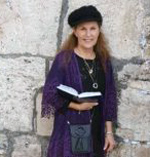By Donald H. Harrison


SAN DIEGO – Before the expected sentence was handed down, family members of the murdered victim looked directly at the confessed shooter on Thursday, Sept. 30, and poured out their hearts.
“What has your racist, entitled rage offered you in the end?” demanded Hannah Kaye of the defendant who had acknowledged murdering her mother, Lori Gilbert Kaye, 60, in the lobby of Chabad of Poway on April 27, 2019, the last day of Passover.
“How have your actions of murdering my mother because she was a Jew benefitted your life and brought you closer to your God?”
During her testimony, Hannah led a recitation of the Kaddish, the Jewish prayer sanctifying God, even in the face of death.
Lori’s widower, Howard Kaye, M.D. , described his slain wife as a “superior person and a wonderful woman,” and questioned what kind of world the defendant had grown up in — given that he was a nursing student, involved in the study of healing, at the same time as he was proclaiming that he wanted to kill Jews. Lori’s sister, Ellen Edwards, demanded of the defendant “How could you kill my beautiful loving sister? You are an animal. You deserved to be locked up forever.”
“Locked up forever,” more or less was the sentence handed down to defendant John T. Earnest in a plea deal that enabled him to avoid the death penalty. Superior Court Judge Peter Deddeh said the defendant must serve life in prison without parole, plus an additional 137 years in prison. The defendant is 22, but no matter how young he is today, under terms of that sentence, he can never leave the confines of prison—not on parole, not as one who completed his time.
San Diego County District Attorney Summer Stephan initially had decided to ask for the death penalty in consideration not only of Lori Gilbert Kaye’s murder, but also the wounding of Almog Peretz and his then 8-year-old niece Noya Dahan, along with Chabad’s then rabbi Yisroel Goldstein (who since was stripped of his post following his confession to unrelated tax fraud) . In addition, the defendant had confessed to attempting to set the Dar-ul-Arqam Mosque in Escondido on fire on March 24, 2019, while seven missionaries slept inside. They awakened and were able to put out the fire before anyone was injured.
Stephan said the Superior Court sentence provided a “semblance of justice,” given the necessity to waive capital punishment because the defendant had struck a similar deal for life imprisonment in federal court where he was accused of violating the civil rights not only of the killed and wounded but also of the more than 50 people inside the synagogue at the time of the shooting. Federal law supersedes state law, leaving California without a way to impose the death penalty. Given California Gov. Gavin Newsom’s announced refusal to apply the death penalty in any case, it was an open question whether the defendant would ever have been executed, even under California procedures.
Stephan said “to come in, in the name of hate, and take out the life of a defenseless, unarmed woman and try to kill and 8-year-old child is the definition of being a coward.”
Deputy District Attorney Leonard Trinh, who heads the hate crimes unit of the district attorney’s office, said the defendant “represents the worst of the humanity,” someone who is “evil, hateful, resentful and entitled.”
Judge Deddeh declined to permit the defendant to make a statement before sentencing him, explaining that he didn’t want his court to be “a political forum for him to start making white supremacist or racist statements” nor “to use this as a platform to add to his celebrity.”
No statement from the defendant was necessary given the agreed upon plead deal, said Deddeh.
*
Donald H. Harrison is editor of San Diego Jewish World. He may be contacted via donald.harrison@sdjewishworld.com